PPDI5039 Spring 2018: Event Management Project and Skills Report
VerifiedAdded on 2023/06/14
|13
|3352
|289
Project
AI Summary
This project report outlines the skills developed during an event management project, focusing on a solo trade fair organized by Penguins, an Event Management organization. It discusses trans-disciplinary models like Gibbs reflective cycle and Kolbe's model of reflection, detailing project phases including preparation and implementation. The report highlights skills developed such as teamwork, problem-solving, time management, and communication, referencing the Interpersonal Communication Competence test results. The learning contract emphasizes the attainment of communication skills, and the portfolio of evidence includes project logs, weekly logs, critical incident diaries, and feedback. The report concludes with an analysis and evaluation of the learning experience, offering insights into areas for improvement and future development. Desklib provides a platform for accessing similar project reports and study tools for students.
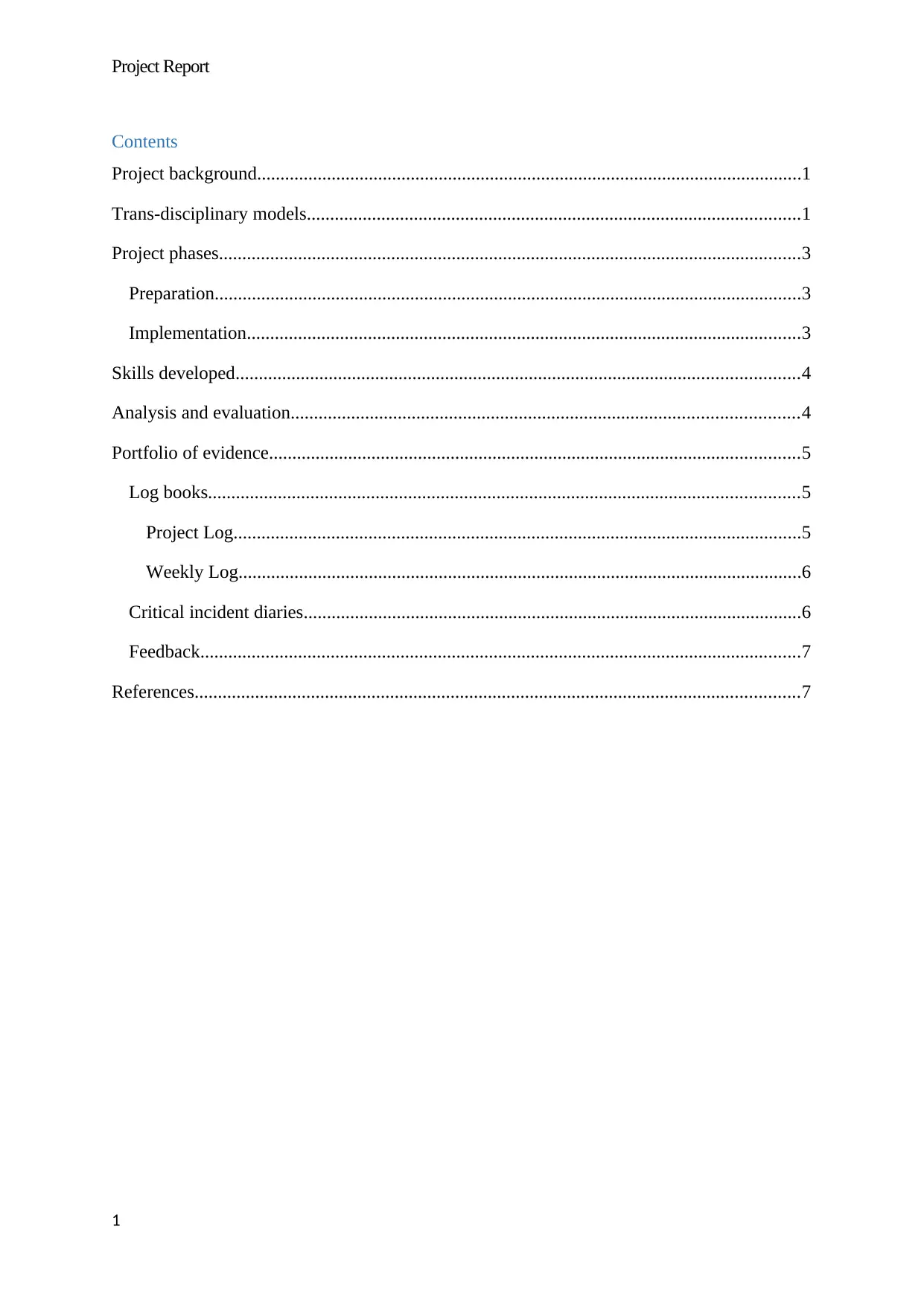
Project Report
Contents
Project background.....................................................................................................................1
Trans-disciplinary models..........................................................................................................1
Project phases.............................................................................................................................3
Preparation..............................................................................................................................3
Implementation.......................................................................................................................3
Skills developed.........................................................................................................................4
Analysis and evaluation.............................................................................................................4
Portfolio of evidence..................................................................................................................5
Log books...............................................................................................................................5
Project Log..........................................................................................................................5
Weekly Log.........................................................................................................................6
Critical incident diaries...........................................................................................................6
Feedback.................................................................................................................................7
References..................................................................................................................................7
1
Contents
Project background.....................................................................................................................1
Trans-disciplinary models..........................................................................................................1
Project phases.............................................................................................................................3
Preparation..............................................................................................................................3
Implementation.......................................................................................................................3
Skills developed.........................................................................................................................4
Analysis and evaluation.............................................................................................................4
Portfolio of evidence..................................................................................................................5
Log books...............................................................................................................................5
Project Log..........................................................................................................................5
Weekly Log.........................................................................................................................6
Critical incident diaries...........................................................................................................6
Feedback.................................................................................................................................7
References..................................................................................................................................7
1
Paraphrase This Document
Need a fresh take? Get an instant paraphrase of this document with our AI Paraphraser
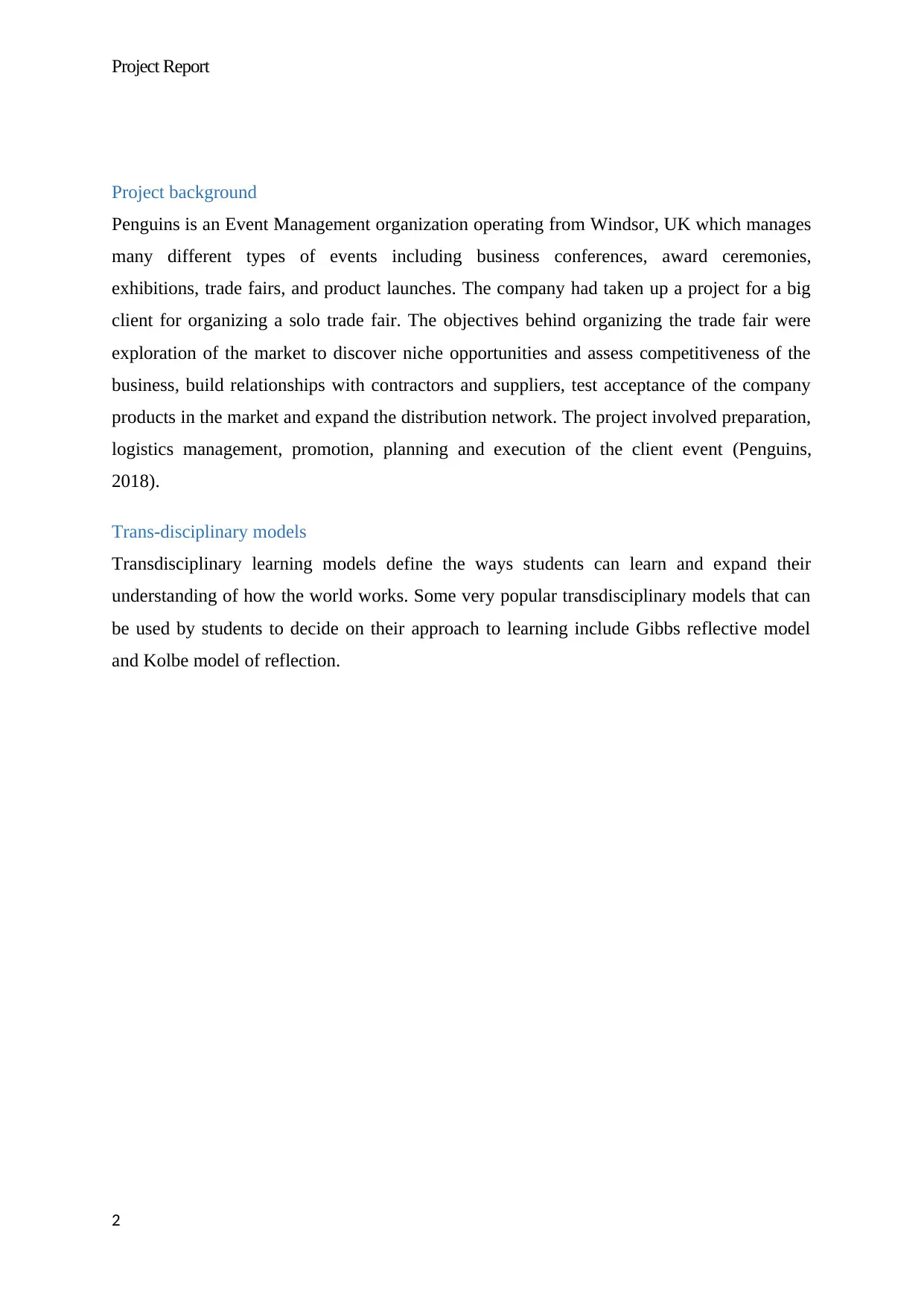
Project Report
Project background
Penguins is an Event Management organization operating from Windsor, UK which manages
many different types of events including business conferences, award ceremonies,
exhibitions, trade fairs, and product launches. The company had taken up a project for a big
client for organizing a solo trade fair. The objectives behind organizing the trade fair were
exploration of the market to discover niche opportunities and assess competitiveness of the
business, build relationships with contractors and suppliers, test acceptance of the company
products in the market and expand the distribution network. The project involved preparation,
logistics management, promotion, planning and execution of the client event (Penguins,
2018).
Trans-disciplinary models
Transdisciplinary learning models define the ways students can learn and expand their
understanding of how the world works. Some very popular transdisciplinary models that can
be used by students to decide on their approach to learning include Gibbs reflective model
and Kolbe model of reflection.
2
Project background
Penguins is an Event Management organization operating from Windsor, UK which manages
many different types of events including business conferences, award ceremonies,
exhibitions, trade fairs, and product launches. The company had taken up a project for a big
client for organizing a solo trade fair. The objectives behind organizing the trade fair were
exploration of the market to discover niche opportunities and assess competitiveness of the
business, build relationships with contractors and suppliers, test acceptance of the company
products in the market and expand the distribution network. The project involved preparation,
logistics management, promotion, planning and execution of the client event (Penguins,
2018).
Trans-disciplinary models
Transdisciplinary learning models define the ways students can learn and expand their
understanding of how the world works. Some very popular transdisciplinary models that can
be used by students to decide on their approach to learning include Gibbs reflective model
and Kolbe model of reflection.
2
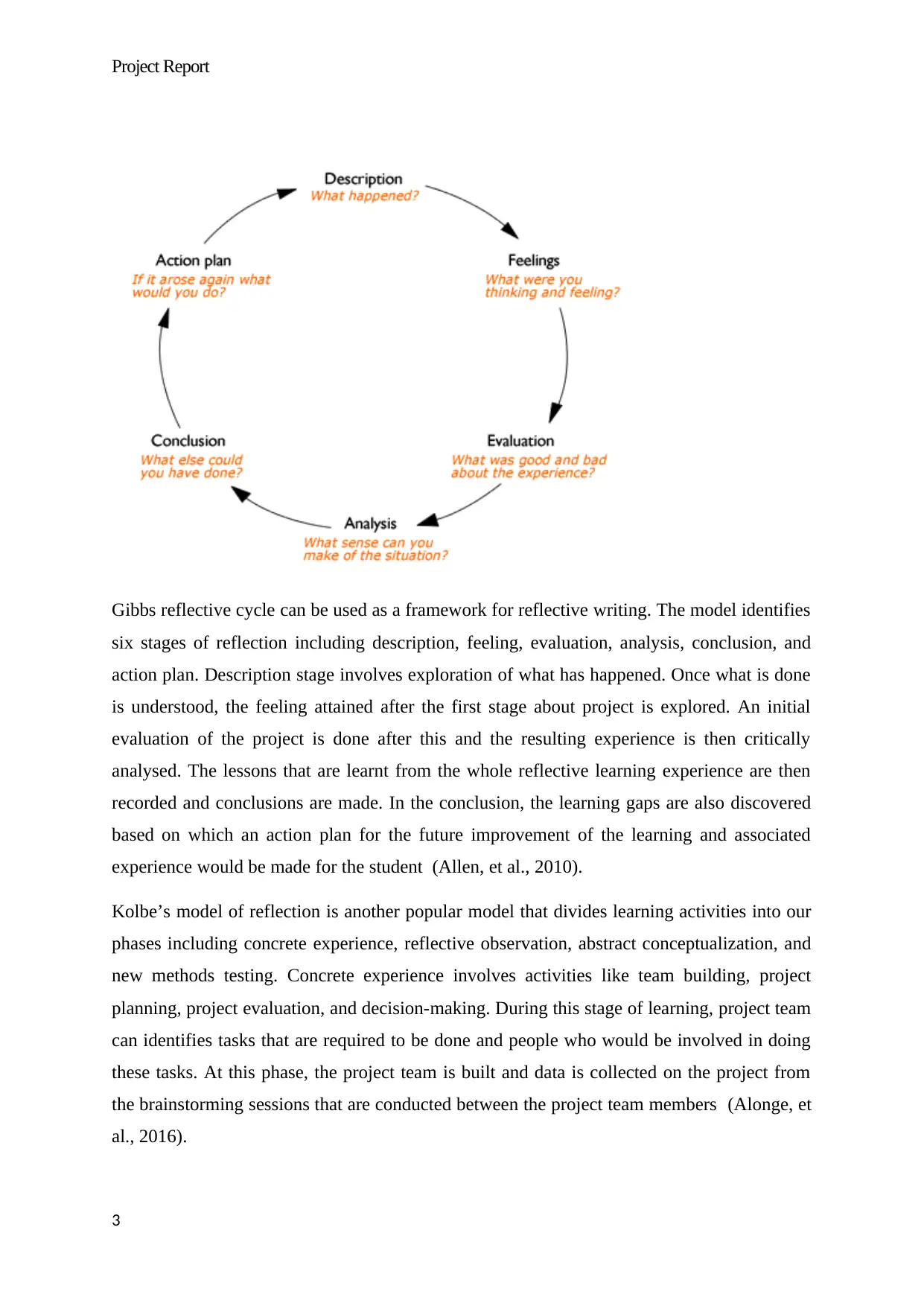
Project Report
Gibbs reflective cycle can be used as a framework for reflective writing. The model identifies
six stages of reflection including description, feeling, evaluation, analysis, conclusion, and
action plan. Description stage involves exploration of what has happened. Once what is done
is understood, the feeling attained after the first stage about project is explored. An initial
evaluation of the project is done after this and the resulting experience is then critically
analysed. The lessons that are learnt from the whole reflective learning experience are then
recorded and conclusions are made. In the conclusion, the learning gaps are also discovered
based on which an action plan for the future improvement of the learning and associated
experience would be made for the student (Allen, et al., 2010).
Kolbe’s model of reflection is another popular model that divides learning activities into our
phases including concrete experience, reflective observation, abstract conceptualization, and
new methods testing. Concrete experience involves activities like team building, project
planning, project evaluation, and decision-making. During this stage of learning, project team
can identifies tasks that are required to be done and people who would be involved in doing
these tasks. At this phase, the project team is built and data is collected on the project from
the brainstorming sessions that are conducted between the project team members (Alonge, et
al., 2016).
3
Gibbs reflective cycle can be used as a framework for reflective writing. The model identifies
six stages of reflection including description, feeling, evaluation, analysis, conclusion, and
action plan. Description stage involves exploration of what has happened. Once what is done
is understood, the feeling attained after the first stage about project is explored. An initial
evaluation of the project is done after this and the resulting experience is then critically
analysed. The lessons that are learnt from the whole reflective learning experience are then
recorded and conclusions are made. In the conclusion, the learning gaps are also discovered
based on which an action plan for the future improvement of the learning and associated
experience would be made for the student (Allen, et al., 2010).
Kolbe’s model of reflection is another popular model that divides learning activities into our
phases including concrete experience, reflective observation, abstract conceptualization, and
new methods testing. Concrete experience involves activities like team building, project
planning, project evaluation, and decision-making. During this stage of learning, project team
can identifies tasks that are required to be done and people who would be involved in doing
these tasks. At this phase, the project team is built and data is collected on the project from
the brainstorming sessions that are conducted between the project team members (Alonge, et
al., 2016).
3
⊘ This is a preview!⊘
Do you want full access?
Subscribe today to unlock all pages.

Trusted by 1+ million students worldwide
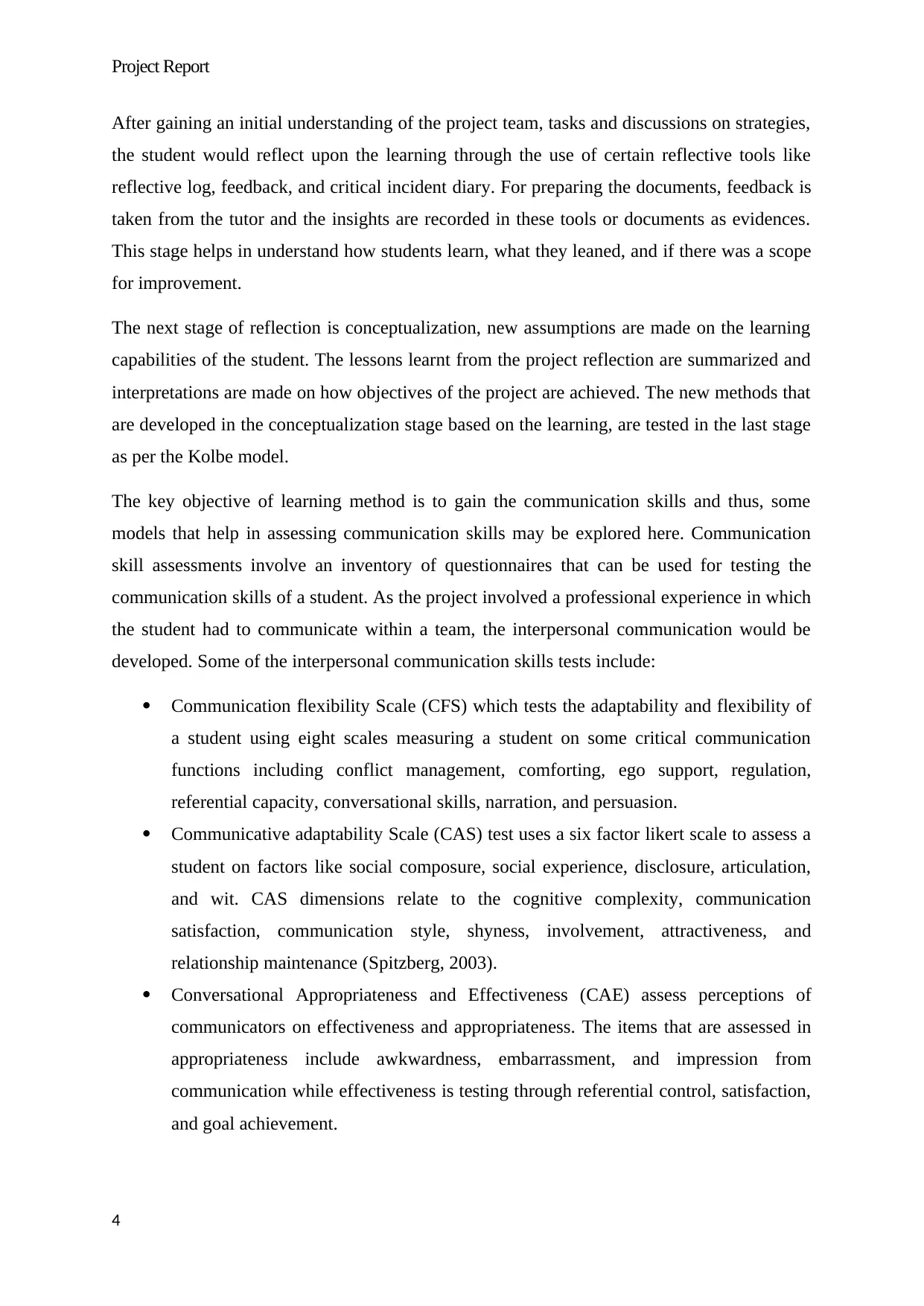
Project Report
After gaining an initial understanding of the project team, tasks and discussions on strategies,
the student would reflect upon the learning through the use of certain reflective tools like
reflective log, feedback, and critical incident diary. For preparing the documents, feedback is
taken from the tutor and the insights are recorded in these tools or documents as evidences.
This stage helps in understand how students learn, what they leaned, and if there was a scope
for improvement.
The next stage of reflection is conceptualization, new assumptions are made on the learning
capabilities of the student. The lessons learnt from the project reflection are summarized and
interpretations are made on how objectives of the project are achieved. The new methods that
are developed in the conceptualization stage based on the learning, are tested in the last stage
as per the Kolbe model.
The key objective of learning method is to gain the communication skills and thus, some
models that help in assessing communication skills may be explored here. Communication
skill assessments involve an inventory of questionnaires that can be used for testing the
communication skills of a student. As the project involved a professional experience in which
the student had to communicate within a team, the interpersonal communication would be
developed. Some of the interpersonal communication skills tests include:
Communication flexibility Scale (CFS) which tests the adaptability and flexibility of
a student using eight scales measuring a student on some critical communication
functions including conflict management, comforting, ego support, regulation,
referential capacity, conversational skills, narration, and persuasion.
Communicative adaptability Scale (CAS) test uses a six factor likert scale to assess a
student on factors like social composure, social experience, disclosure, articulation,
and wit. CAS dimensions relate to the cognitive complexity, communication
satisfaction, communication style, shyness, involvement, attractiveness, and
relationship maintenance (Spitzberg, 2003).
Conversational Appropriateness and Effectiveness (CAE) assess perceptions of
communicators on effectiveness and appropriateness. The items that are assessed in
appropriateness include awkwardness, embarrassment, and impression from
communication while effectiveness is testing through referential control, satisfaction,
and goal achievement.
4
After gaining an initial understanding of the project team, tasks and discussions on strategies,
the student would reflect upon the learning through the use of certain reflective tools like
reflective log, feedback, and critical incident diary. For preparing the documents, feedback is
taken from the tutor and the insights are recorded in these tools or documents as evidences.
This stage helps in understand how students learn, what they leaned, and if there was a scope
for improvement.
The next stage of reflection is conceptualization, new assumptions are made on the learning
capabilities of the student. The lessons learnt from the project reflection are summarized and
interpretations are made on how objectives of the project are achieved. The new methods that
are developed in the conceptualization stage based on the learning, are tested in the last stage
as per the Kolbe model.
The key objective of learning method is to gain the communication skills and thus, some
models that help in assessing communication skills may be explored here. Communication
skill assessments involve an inventory of questionnaires that can be used for testing the
communication skills of a student. As the project involved a professional experience in which
the student had to communicate within a team, the interpersonal communication would be
developed. Some of the interpersonal communication skills tests include:
Communication flexibility Scale (CFS) which tests the adaptability and flexibility of
a student using eight scales measuring a student on some critical communication
functions including conflict management, comforting, ego support, regulation,
referential capacity, conversational skills, narration, and persuasion.
Communicative adaptability Scale (CAS) test uses a six factor likert scale to assess a
student on factors like social composure, social experience, disclosure, articulation,
and wit. CAS dimensions relate to the cognitive complexity, communication
satisfaction, communication style, shyness, involvement, attractiveness, and
relationship maintenance (Spitzberg, 2003).
Conversational Appropriateness and Effectiveness (CAE) assess perceptions of
communicators on effectiveness and appropriateness. The items that are assessed in
appropriateness include awkwardness, embarrassment, and impression from
communication while effectiveness is testing through referential control, satisfaction,
and goal achievement.
4
Paraphrase This Document
Need a fresh take? Get an instant paraphrase of this document with our AI Paraphraser
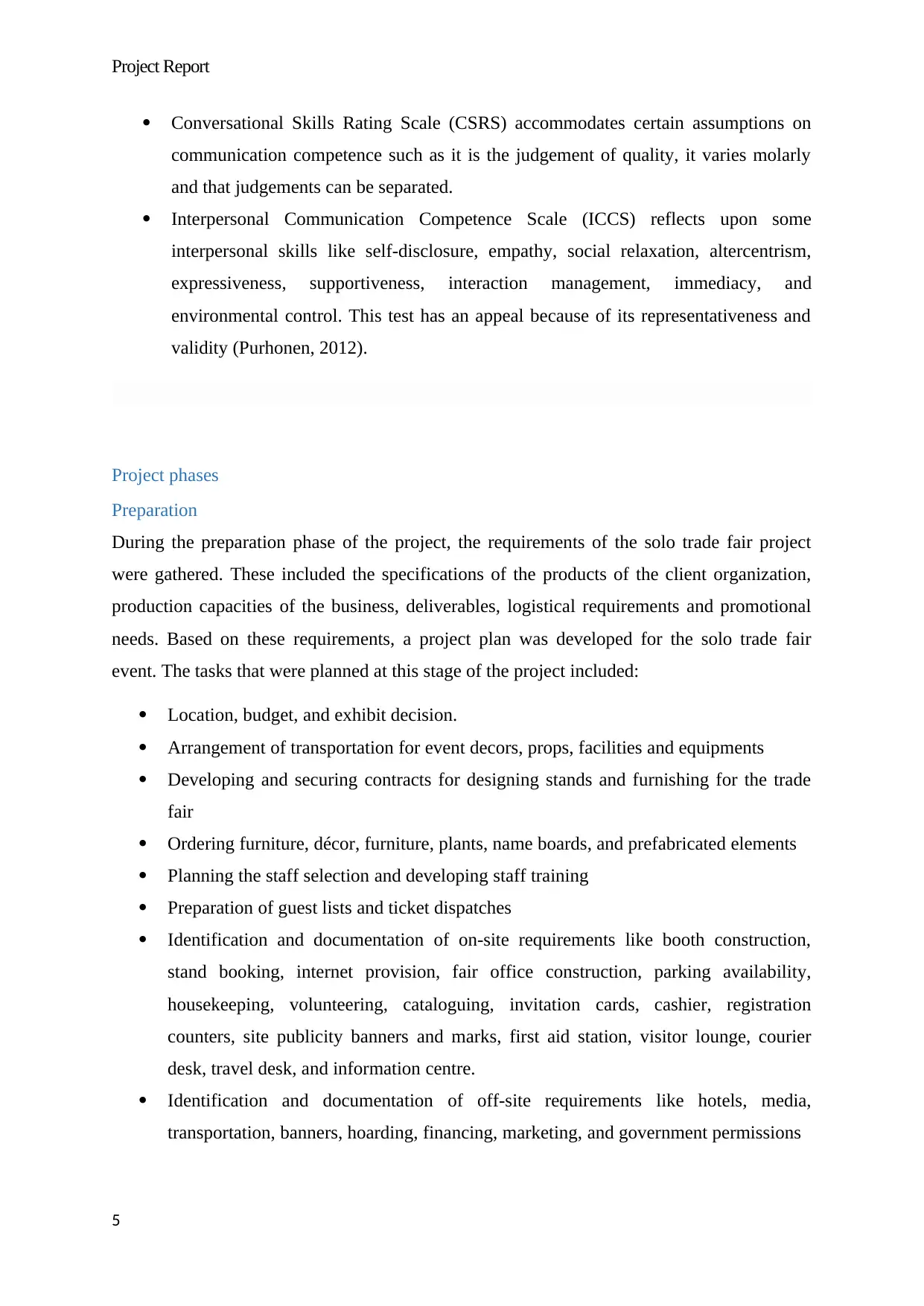
Project Report
Conversational Skills Rating Scale (CSRS) accommodates certain assumptions on
communication competence such as it is the judgement of quality, it varies molarly
and that judgements can be separated.
Interpersonal Communication Competence Scale (ICCS) reflects upon some
interpersonal skills like self-disclosure, empathy, social relaxation, altercentrism,
expressiveness, supportiveness, interaction management, immediacy, and
environmental control. This test has an appeal because of its representativeness and
validity (Purhonen, 2012).
Project phases
Preparation
During the preparation phase of the project, the requirements of the solo trade fair project
were gathered. These included the specifications of the products of the client organization,
production capacities of the business, deliverables, logistical requirements and promotional
needs. Based on these requirements, a project plan was developed for the solo trade fair
event. The tasks that were planned at this stage of the project included:
Location, budget, and exhibit decision.
Arrangement of transportation for event decors, props, facilities and equipments
Developing and securing contracts for designing stands and furnishing for the trade
fair
Ordering furniture, décor, furniture, plants, name boards, and prefabricated elements
Planning the staff selection and developing staff training
Preparation of guest lists and ticket dispatches
Identification and documentation of on-site requirements like booth construction,
stand booking, internet provision, fair office construction, parking availability,
housekeeping, volunteering, cataloguing, invitation cards, cashier, registration
counters, site publicity banners and marks, first aid station, visitor lounge, courier
desk, travel desk, and information centre.
Identification and documentation of off-site requirements like hotels, media,
transportation, banners, hoarding, financing, marketing, and government permissions
5
Conversational Skills Rating Scale (CSRS) accommodates certain assumptions on
communication competence such as it is the judgement of quality, it varies molarly
and that judgements can be separated.
Interpersonal Communication Competence Scale (ICCS) reflects upon some
interpersonal skills like self-disclosure, empathy, social relaxation, altercentrism,
expressiveness, supportiveness, interaction management, immediacy, and
environmental control. This test has an appeal because of its representativeness and
validity (Purhonen, 2012).
Project phases
Preparation
During the preparation phase of the project, the requirements of the solo trade fair project
were gathered. These included the specifications of the products of the client organization,
production capacities of the business, deliverables, logistical requirements and promotional
needs. Based on these requirements, a project plan was developed for the solo trade fair
event. The tasks that were planned at this stage of the project included:
Location, budget, and exhibit decision.
Arrangement of transportation for event decors, props, facilities and equipments
Developing and securing contracts for designing stands and furnishing for the trade
fair
Ordering furniture, décor, furniture, plants, name boards, and prefabricated elements
Planning the staff selection and developing staff training
Preparation of guest lists and ticket dispatches
Identification and documentation of on-site requirements like booth construction,
stand booking, internet provision, fair office construction, parking availability,
housekeeping, volunteering, cataloguing, invitation cards, cashier, registration
counters, site publicity banners and marks, first aid station, visitor lounge, courier
desk, travel desk, and information centre.
Identification and documentation of off-site requirements like hotels, media,
transportation, banners, hoarding, financing, marketing, and government permissions
5
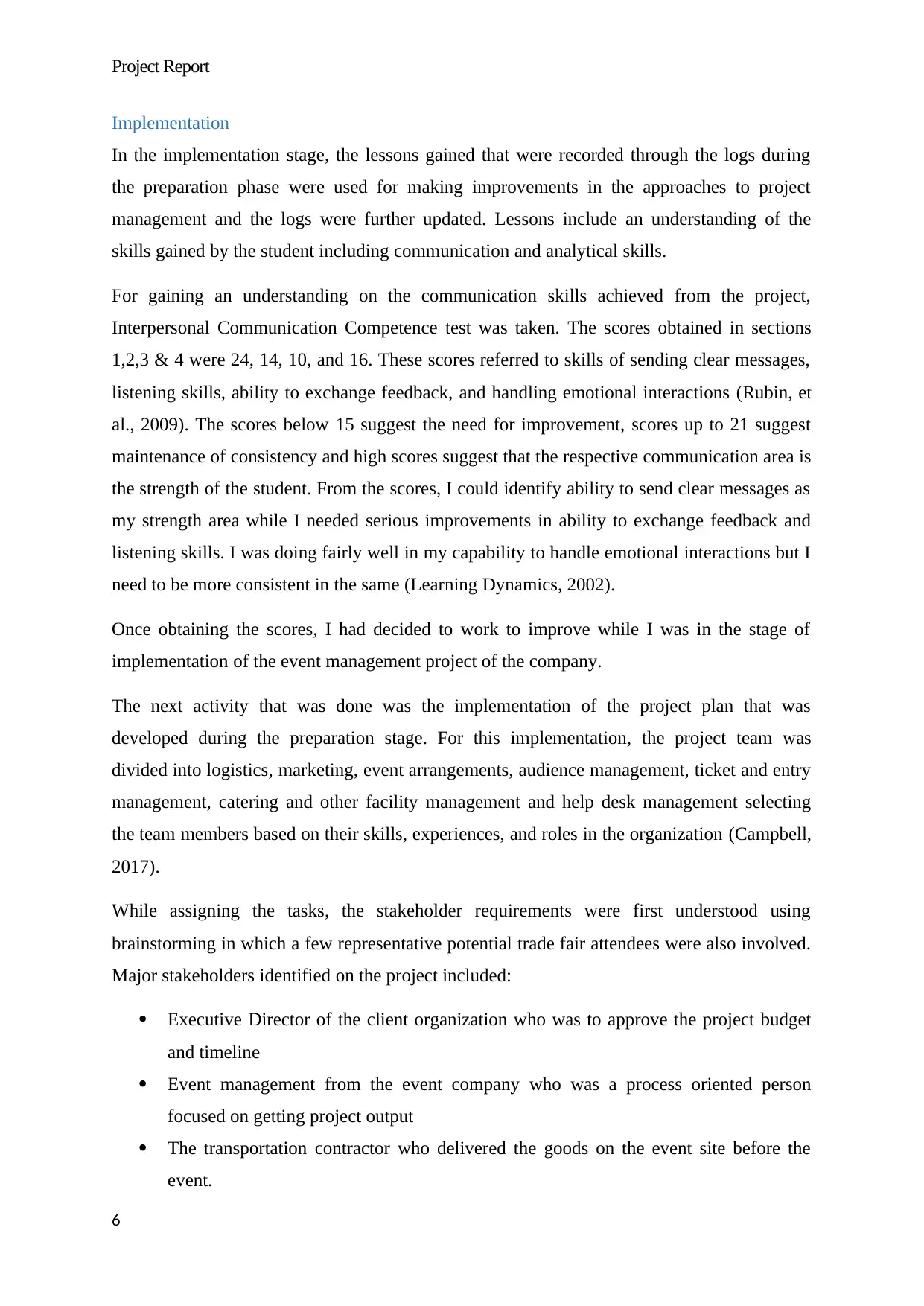
Project Report
Implementation
In the implementation stage, the lessons gained that were recorded through the logs during
the preparation phase were used for making improvements in the approaches to project
management and the logs were further updated. Lessons include an understanding of the
skills gained by the student including communication and analytical skills.
For gaining an understanding on the communication skills achieved from the project,
Interpersonal Communication Competence test was taken. The scores obtained in sections
1,2,3 & 4 were 24, 14, 10, and 16. These scores referred to skills of sending clear messages,
listening skills, ability to exchange feedback, and handling emotional interactions (Rubin, et
al., 2009). The scores below 15 suggest the need for improvement, scores up to 21 suggest
maintenance of consistency and high scores suggest that the respective communication area is
the strength of the student. From the scores, I could identify ability to send clear messages as
my strength area while I needed serious improvements in ability to exchange feedback and
listening skills. I was doing fairly well in my capability to handle emotional interactions but I
need to be more consistent in the same (Learning Dynamics, 2002).
Once obtaining the scores, I had decided to work to improve while I was in the stage of
implementation of the event management project of the company.
The next activity that was done was the implementation of the project plan that was
developed during the preparation stage. For this implementation, the project team was
divided into logistics, marketing, event arrangements, audience management, ticket and entry
management, catering and other facility management and help desk management selecting
the team members based on their skills, experiences, and roles in the organization (Campbell,
2017).
While assigning the tasks, the stakeholder requirements were first understood using
brainstorming in which a few representative potential trade fair attendees were also involved.
Major stakeholders identified on the project included:
Executive Director of the client organization who was to approve the project budget
and timeline
Event management from the event company who was a process oriented person
focused on getting project output
The transportation contractor who delivered the goods on the event site before the
event.
6
Implementation
In the implementation stage, the lessons gained that were recorded through the logs during
the preparation phase were used for making improvements in the approaches to project
management and the logs were further updated. Lessons include an understanding of the
skills gained by the student including communication and analytical skills.
For gaining an understanding on the communication skills achieved from the project,
Interpersonal Communication Competence test was taken. The scores obtained in sections
1,2,3 & 4 were 24, 14, 10, and 16. These scores referred to skills of sending clear messages,
listening skills, ability to exchange feedback, and handling emotional interactions (Rubin, et
al., 2009). The scores below 15 suggest the need for improvement, scores up to 21 suggest
maintenance of consistency and high scores suggest that the respective communication area is
the strength of the student. From the scores, I could identify ability to send clear messages as
my strength area while I needed serious improvements in ability to exchange feedback and
listening skills. I was doing fairly well in my capability to handle emotional interactions but I
need to be more consistent in the same (Learning Dynamics, 2002).
Once obtaining the scores, I had decided to work to improve while I was in the stage of
implementation of the event management project of the company.
The next activity that was done was the implementation of the project plan that was
developed during the preparation stage. For this implementation, the project team was
divided into logistics, marketing, event arrangements, audience management, ticket and entry
management, catering and other facility management and help desk management selecting
the team members based on their skills, experiences, and roles in the organization (Campbell,
2017).
While assigning the tasks, the stakeholder requirements were first understood using
brainstorming in which a few representative potential trade fair attendees were also involved.
Major stakeholders identified on the project included:
Executive Director of the client organization who was to approve the project budget
and timeline
Event management from the event company who was a process oriented person
focused on getting project output
The transportation contractor who delivered the goods on the event site before the
event.
6
⊘ This is a preview!⊘
Do you want full access?
Subscribe today to unlock all pages.

Trusted by 1+ million students worldwide
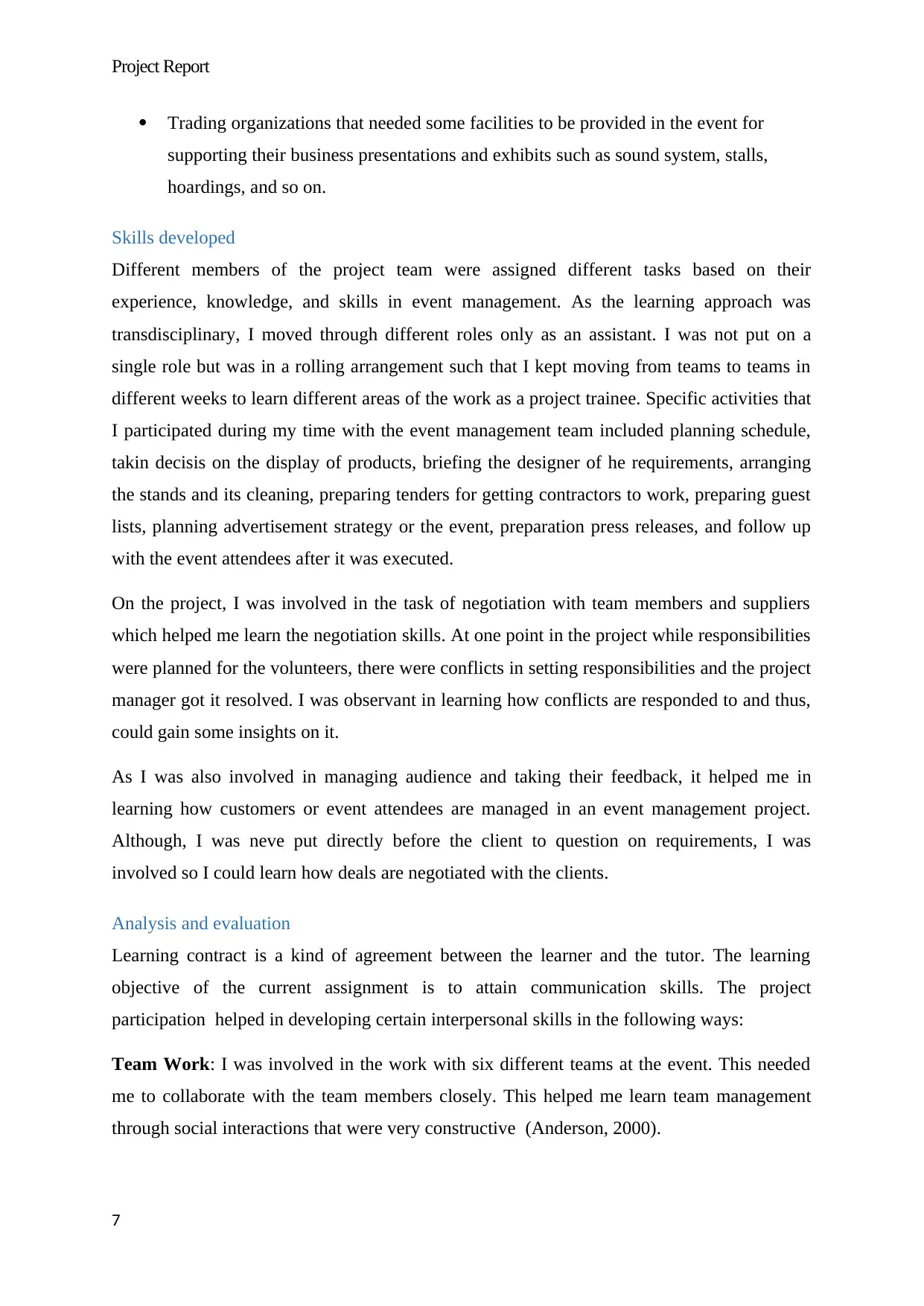
Project Report
Trading organizations that needed some facilities to be provided in the event for
supporting their business presentations and exhibits such as sound system, stalls,
hoardings, and so on.
Skills developed
Different members of the project team were assigned different tasks based on their
experience, knowledge, and skills in event management. As the learning approach was
transdisciplinary, I moved through different roles only as an assistant. I was not put on a
single role but was in a rolling arrangement such that I kept moving from teams to teams in
different weeks to learn different areas of the work as a project trainee. Specific activities that
I participated during my time with the event management team included planning schedule,
takin decisis on the display of products, briefing the designer of he requirements, arranging
the stands and its cleaning, preparing tenders for getting contractors to work, preparing guest
lists, planning advertisement strategy or the event, preparation press releases, and follow up
with the event attendees after it was executed.
On the project, I was involved in the task of negotiation with team members and suppliers
which helped me learn the negotiation skills. At one point in the project while responsibilities
were planned for the volunteers, there were conflicts in setting responsibilities and the project
manager got it resolved. I was observant in learning how conflicts are responded to and thus,
could gain some insights on it.
As I was also involved in managing audience and taking their feedback, it helped me in
learning how customers or event attendees are managed in an event management project.
Although, I was neve put directly before the client to question on requirements, I was
involved so I could learn how deals are negotiated with the clients.
Analysis and evaluation
Learning contract is a kind of agreement between the learner and the tutor. The learning
objective of the current assignment is to attain communication skills. The project
participation helped in developing certain interpersonal skills in the following ways:
Team Work: I was involved in the work with six different teams at the event. This needed
me to collaborate with the team members closely. This helped me learn team management
through social interactions that were very constructive (Anderson, 2000).
7
Trading organizations that needed some facilities to be provided in the event for
supporting their business presentations and exhibits such as sound system, stalls,
hoardings, and so on.
Skills developed
Different members of the project team were assigned different tasks based on their
experience, knowledge, and skills in event management. As the learning approach was
transdisciplinary, I moved through different roles only as an assistant. I was not put on a
single role but was in a rolling arrangement such that I kept moving from teams to teams in
different weeks to learn different areas of the work as a project trainee. Specific activities that
I participated during my time with the event management team included planning schedule,
takin decisis on the display of products, briefing the designer of he requirements, arranging
the stands and its cleaning, preparing tenders for getting contractors to work, preparing guest
lists, planning advertisement strategy or the event, preparation press releases, and follow up
with the event attendees after it was executed.
On the project, I was involved in the task of negotiation with team members and suppliers
which helped me learn the negotiation skills. At one point in the project while responsibilities
were planned for the volunteers, there were conflicts in setting responsibilities and the project
manager got it resolved. I was observant in learning how conflicts are responded to and thus,
could gain some insights on it.
As I was also involved in managing audience and taking their feedback, it helped me in
learning how customers or event attendees are managed in an event management project.
Although, I was neve put directly before the client to question on requirements, I was
involved so I could learn how deals are negotiated with the clients.
Analysis and evaluation
Learning contract is a kind of agreement between the learner and the tutor. The learning
objective of the current assignment is to attain communication skills. The project
participation helped in developing certain interpersonal skills in the following ways:
Team Work: I was involved in the work with six different teams at the event. This needed
me to collaborate with the team members closely. This helped me learn team management
through social interactions that were very constructive (Anderson, 2000).
7
Paraphrase This Document
Need a fresh take? Get an instant paraphrase of this document with our AI Paraphraser
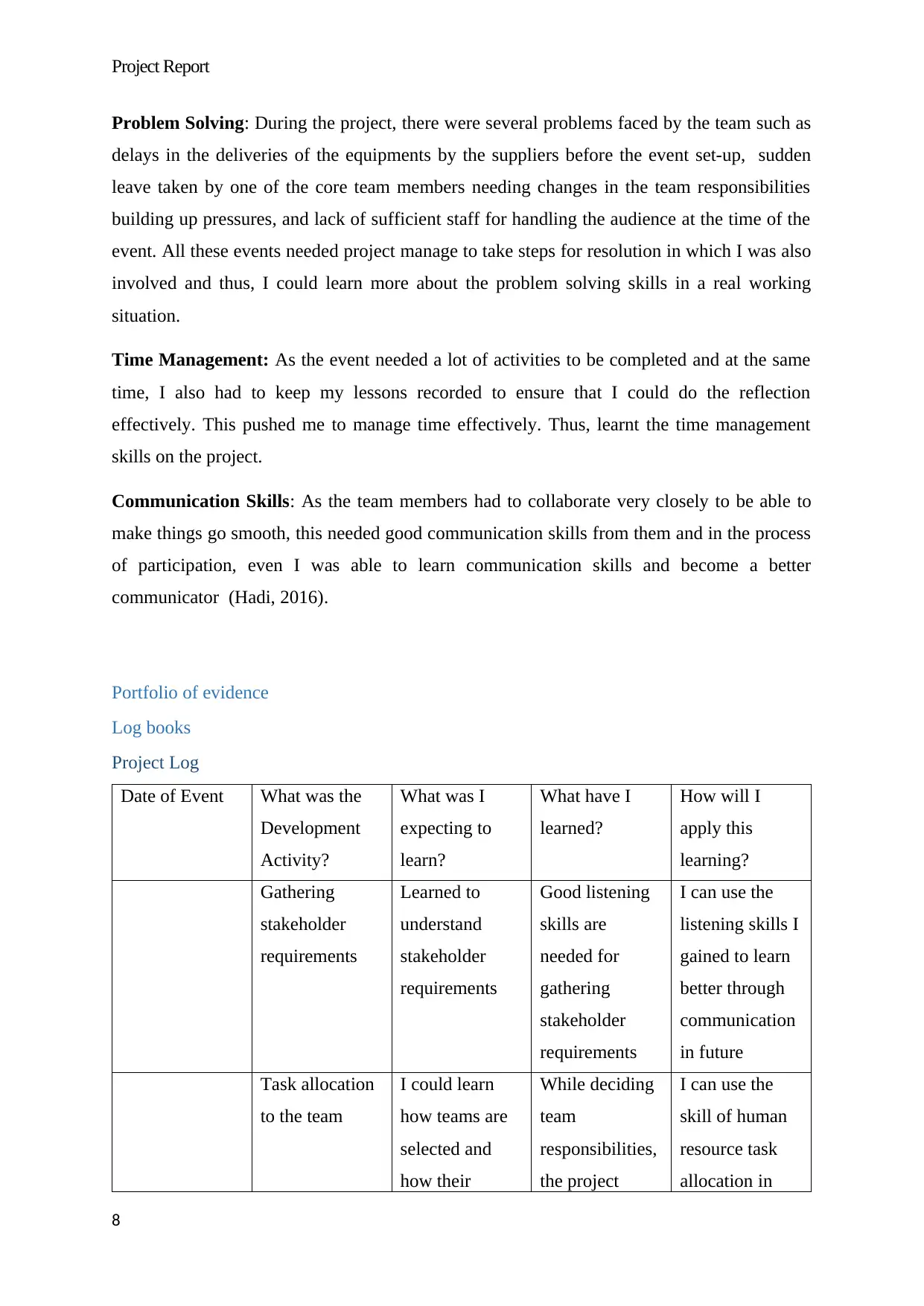
Project Report
Problem Solving: During the project, there were several problems faced by the team such as
delays in the deliveries of the equipments by the suppliers before the event set-up, sudden
leave taken by one of the core team members needing changes in the team responsibilities
building up pressures, and lack of sufficient staff for handling the audience at the time of the
event. All these events needed project manage to take steps for resolution in which I was also
involved and thus, I could learn more about the problem solving skills in a real working
situation.
Time Management: As the event needed a lot of activities to be completed and at the same
time, I also had to keep my lessons recorded to ensure that I could do the reflection
effectively. This pushed me to manage time effectively. Thus, learnt the time management
skills on the project.
Communication Skills: As the team members had to collaborate very closely to be able to
make things go smooth, this needed good communication skills from them and in the process
of participation, even I was able to learn communication skills and become a better
communicator (Hadi, 2016).
Portfolio of evidence
Log books
Project Log
Date of Event What was the
Development
Activity?
What was I
expecting to
learn?
What have I
learned?
How will I
apply this
learning?
Gathering
stakeholder
requirements
Learned to
understand
stakeholder
requirements
Good listening
skills are
needed for
gathering
stakeholder
requirements
I can use the
listening skills I
gained to learn
better through
communication
in future
Task allocation
to the team
I could learn
how teams are
selected and
how their
While deciding
team
responsibilities,
the project
I can use the
skill of human
resource task
allocation in
8
Problem Solving: During the project, there were several problems faced by the team such as
delays in the deliveries of the equipments by the suppliers before the event set-up, sudden
leave taken by one of the core team members needing changes in the team responsibilities
building up pressures, and lack of sufficient staff for handling the audience at the time of the
event. All these events needed project manage to take steps for resolution in which I was also
involved and thus, I could learn more about the problem solving skills in a real working
situation.
Time Management: As the event needed a lot of activities to be completed and at the same
time, I also had to keep my lessons recorded to ensure that I could do the reflection
effectively. This pushed me to manage time effectively. Thus, learnt the time management
skills on the project.
Communication Skills: As the team members had to collaborate very closely to be able to
make things go smooth, this needed good communication skills from them and in the process
of participation, even I was able to learn communication skills and become a better
communicator (Hadi, 2016).
Portfolio of evidence
Log books
Project Log
Date of Event What was the
Development
Activity?
What was I
expecting to
learn?
What have I
learned?
How will I
apply this
learning?
Gathering
stakeholder
requirements
Learned to
understand
stakeholder
requirements
Good listening
skills are
needed for
gathering
stakeholder
requirements
I can use the
listening skills I
gained to learn
better through
communication
in future
Task allocation
to the team
I could learn
how teams are
selected and
how their
While deciding
team
responsibilities,
the project
I can use the
skill of human
resource task
allocation in
8
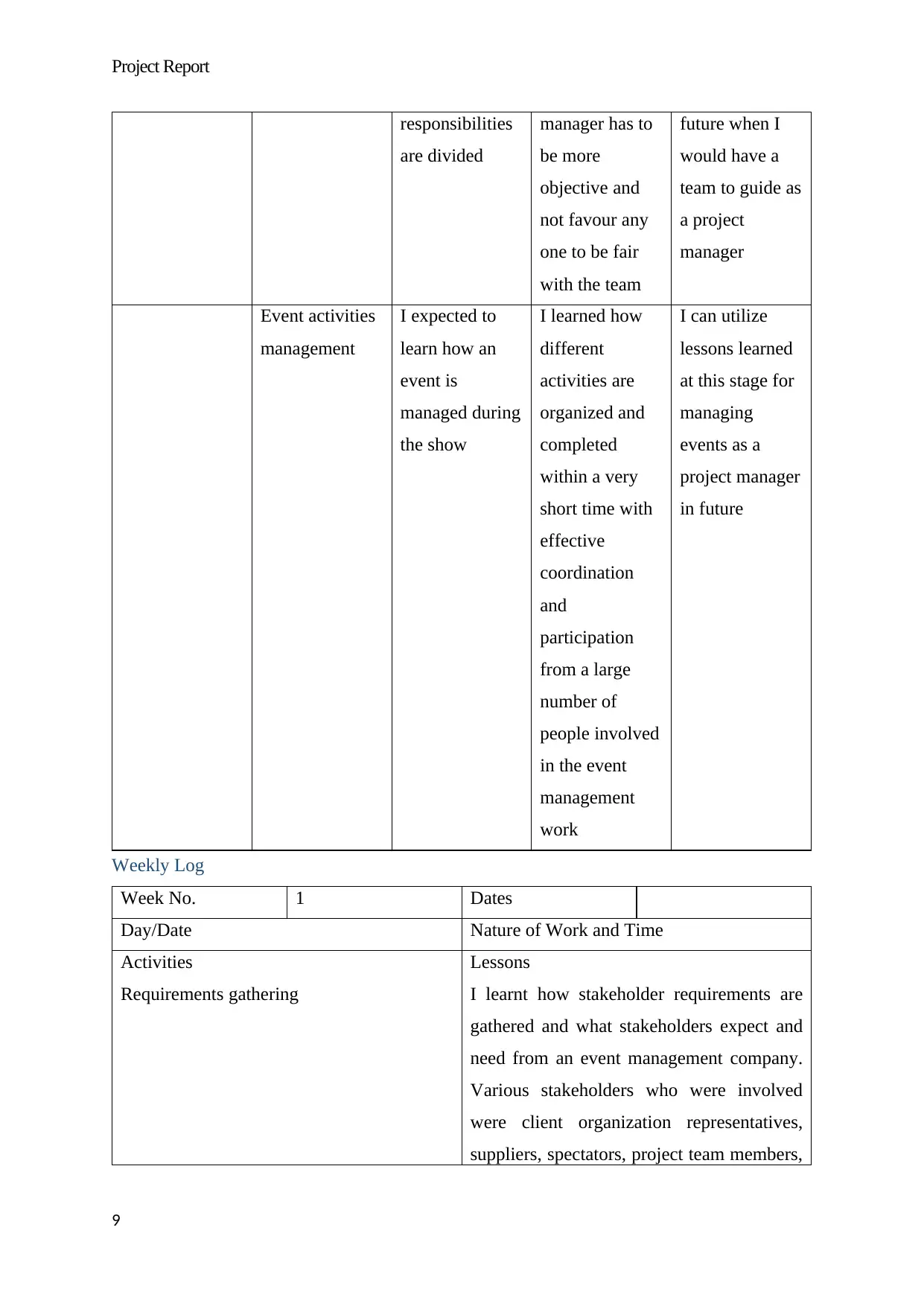
Project Report
responsibilities
are divided
manager has to
be more
objective and
not favour any
one to be fair
with the team
future when I
would have a
team to guide as
a project
manager
Event activities
management
I expected to
learn how an
event is
managed during
the show
I learned how
different
activities are
organized and
completed
within a very
short time with
effective
coordination
and
participation
from a large
number of
people involved
in the event
management
work
I can utilize
lessons learned
at this stage for
managing
events as a
project manager
in future
Weekly Log
Week No. 1 Dates
Day/Date Nature of Work and Time
Activities
Requirements gathering
Lessons
I learnt how stakeholder requirements are
gathered and what stakeholders expect and
need from an event management company.
Various stakeholders who were involved
were client organization representatives,
suppliers, spectators, project team members,
9
responsibilities
are divided
manager has to
be more
objective and
not favour any
one to be fair
with the team
future when I
would have a
team to guide as
a project
manager
Event activities
management
I expected to
learn how an
event is
managed during
the show
I learned how
different
activities are
organized and
completed
within a very
short time with
effective
coordination
and
participation
from a large
number of
people involved
in the event
management
work
I can utilize
lessons learned
at this stage for
managing
events as a
project manager
in future
Weekly Log
Week No. 1 Dates
Day/Date Nature of Work and Time
Activities
Requirements gathering
Lessons
I learnt how stakeholder requirements are
gathered and what stakeholders expect and
need from an event management company.
Various stakeholders who were involved
were client organization representatives,
suppliers, spectators, project team members,
9
⊘ This is a preview!⊘
Do you want full access?
Subscribe today to unlock all pages.

Trusted by 1+ million students worldwide
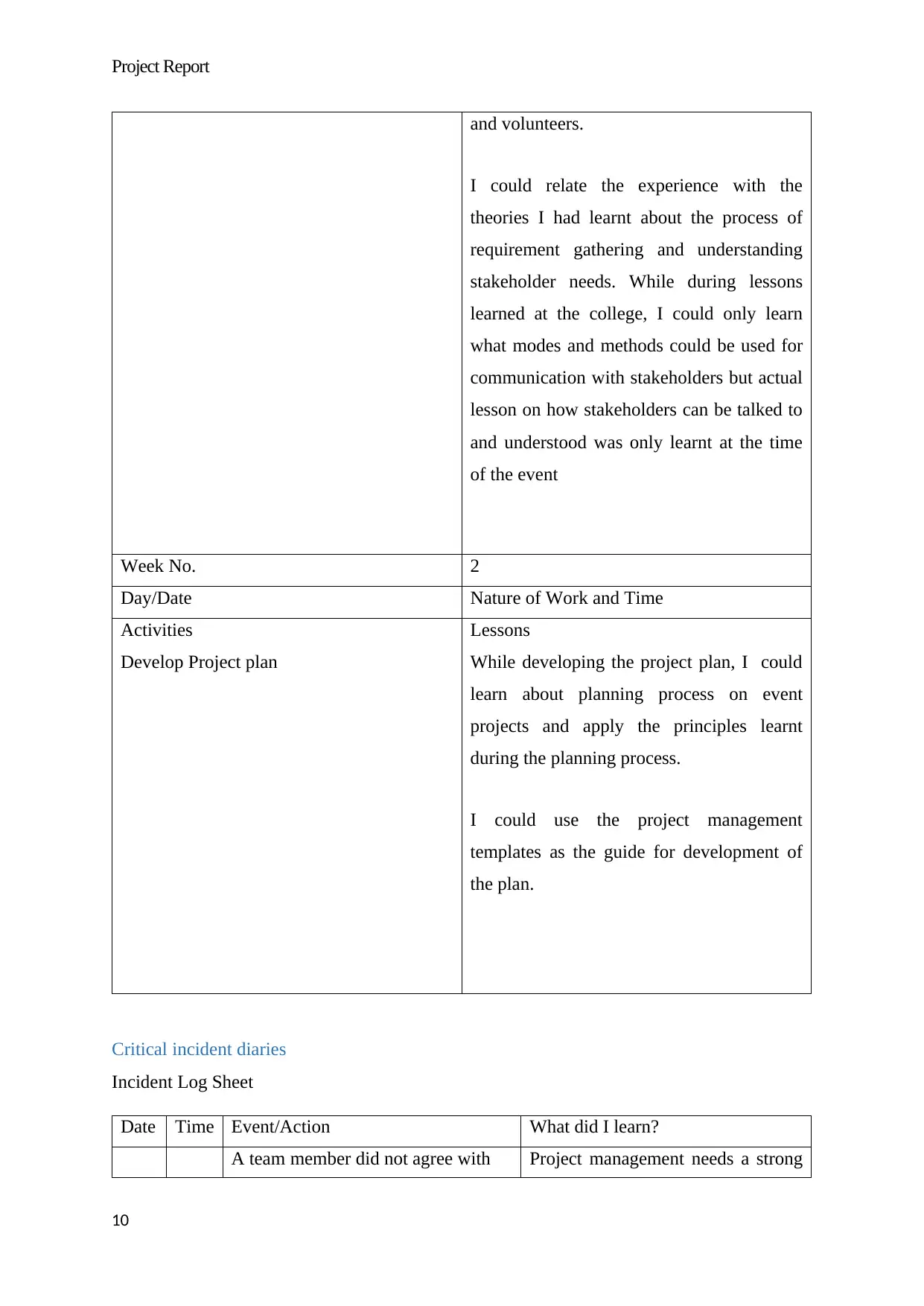
Project Report
and volunteers.
I could relate the experience with the
theories I had learnt about the process of
requirement gathering and understanding
stakeholder needs. While during lessons
learned at the college, I could only learn
what modes and methods could be used for
communication with stakeholders but actual
lesson on how stakeholders can be talked to
and understood was only learnt at the time
of the event
Week No. 2
Day/Date Nature of Work and Time
Activities
Develop Project plan
Lessons
While developing the project plan, I could
learn about planning process on event
projects and apply the principles learnt
during the planning process.
I could use the project management
templates as the guide for development of
the plan.
Critical incident diaries
Incident Log Sheet
Date Time Event/Action What did I learn?
A team member did not agree with Project management needs a strong
10
and volunteers.
I could relate the experience with the
theories I had learnt about the process of
requirement gathering and understanding
stakeholder needs. While during lessons
learned at the college, I could only learn
what modes and methods could be used for
communication with stakeholders but actual
lesson on how stakeholders can be talked to
and understood was only learnt at the time
of the event
Week No. 2
Day/Date Nature of Work and Time
Activities
Develop Project plan
Lessons
While developing the project plan, I could
learn about planning process on event
projects and apply the principles learnt
during the planning process.
I could use the project management
templates as the guide for development of
the plan.
Critical incident diaries
Incident Log Sheet
Date Time Event/Action What did I learn?
A team member did not agree with Project management needs a strong
10
Paraphrase This Document
Need a fresh take? Get an instant paraphrase of this document with our AI Paraphraser
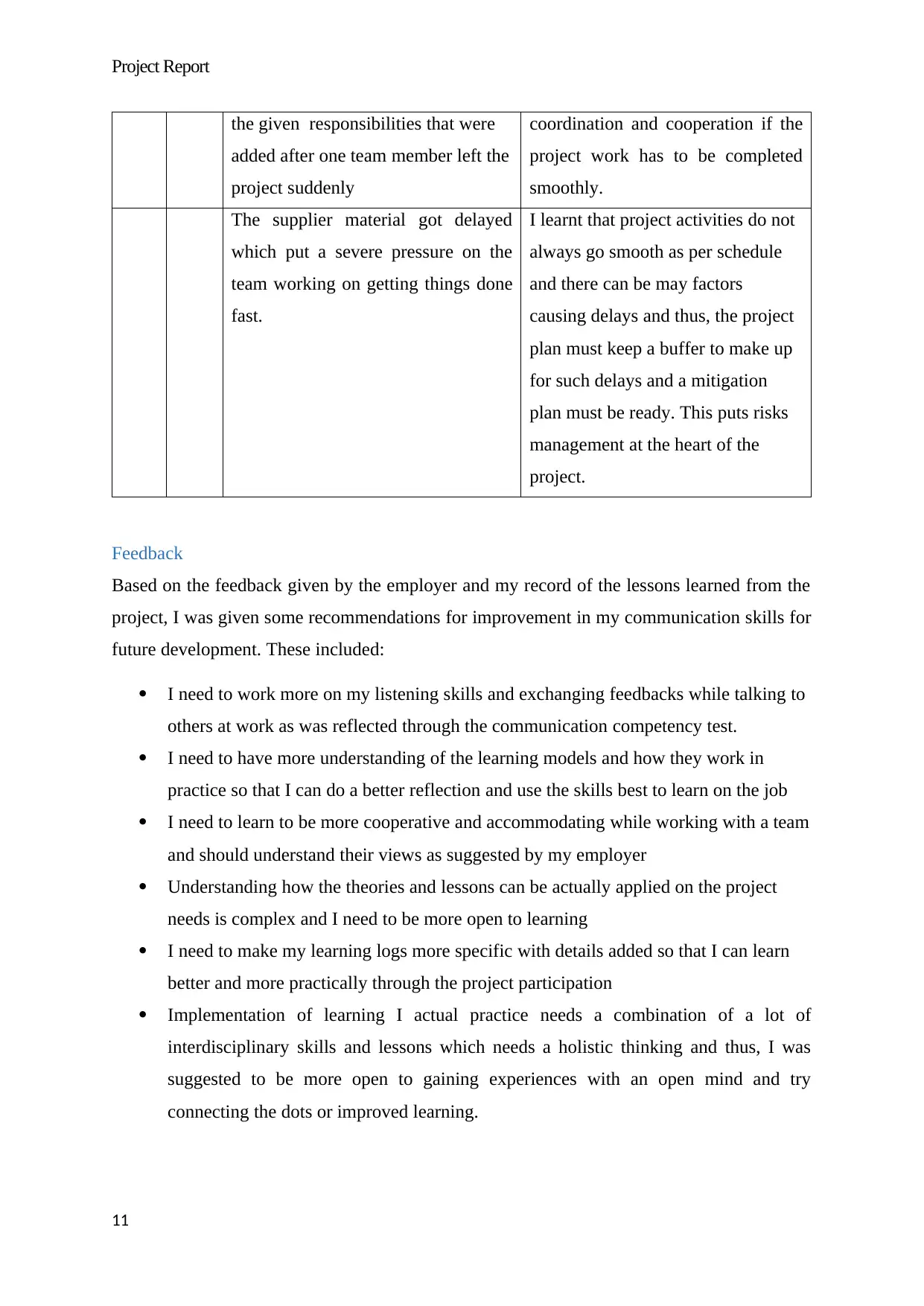
Project Report
the given responsibilities that were
added after one team member left the
project suddenly
coordination and cooperation if the
project work has to be completed
smoothly.
The supplier material got delayed
which put a severe pressure on the
team working on getting things done
fast.
I learnt that project activities do not
always go smooth as per schedule
and there can be may factors
causing delays and thus, the project
plan must keep a buffer to make up
for such delays and a mitigation
plan must be ready. This puts risks
management at the heart of the
project.
Feedback
Based on the feedback given by the employer and my record of the lessons learned from the
project, I was given some recommendations for improvement in my communication skills for
future development. These included:
I need to work more on my listening skills and exchanging feedbacks while talking to
others at work as was reflected through the communication competency test.
I need to have more understanding of the learning models and how they work in
practice so that I can do a better reflection and use the skills best to learn on the job
I need to learn to be more cooperative and accommodating while working with a team
and should understand their views as suggested by my employer
Understanding how the theories and lessons can be actually applied on the project
needs is complex and I need to be more open to learning
I need to make my learning logs more specific with details added so that I can learn
better and more practically through the project participation
Implementation of learning I actual practice needs a combination of a lot of
interdisciplinary skills and lessons which needs a holistic thinking and thus, I was
suggested to be more open to gaining experiences with an open mind and try
connecting the dots or improved learning.
11
the given responsibilities that were
added after one team member left the
project suddenly
coordination and cooperation if the
project work has to be completed
smoothly.
The supplier material got delayed
which put a severe pressure on the
team working on getting things done
fast.
I learnt that project activities do not
always go smooth as per schedule
and there can be may factors
causing delays and thus, the project
plan must keep a buffer to make up
for such delays and a mitigation
plan must be ready. This puts risks
management at the heart of the
project.
Feedback
Based on the feedback given by the employer and my record of the lessons learned from the
project, I was given some recommendations for improvement in my communication skills for
future development. These included:
I need to work more on my listening skills and exchanging feedbacks while talking to
others at work as was reflected through the communication competency test.
I need to have more understanding of the learning models and how they work in
practice so that I can do a better reflection and use the skills best to learn on the job
I need to learn to be more cooperative and accommodating while working with a team
and should understand their views as suggested by my employer
Understanding how the theories and lessons can be actually applied on the project
needs is complex and I need to be more open to learning
I need to make my learning logs more specific with details added so that I can learn
better and more practically through the project participation
Implementation of learning I actual practice needs a combination of a lot of
interdisciplinary skills and lessons which needs a holistic thinking and thus, I was
suggested to be more open to gaining experiences with an open mind and try
connecting the dots or improved learning.
11
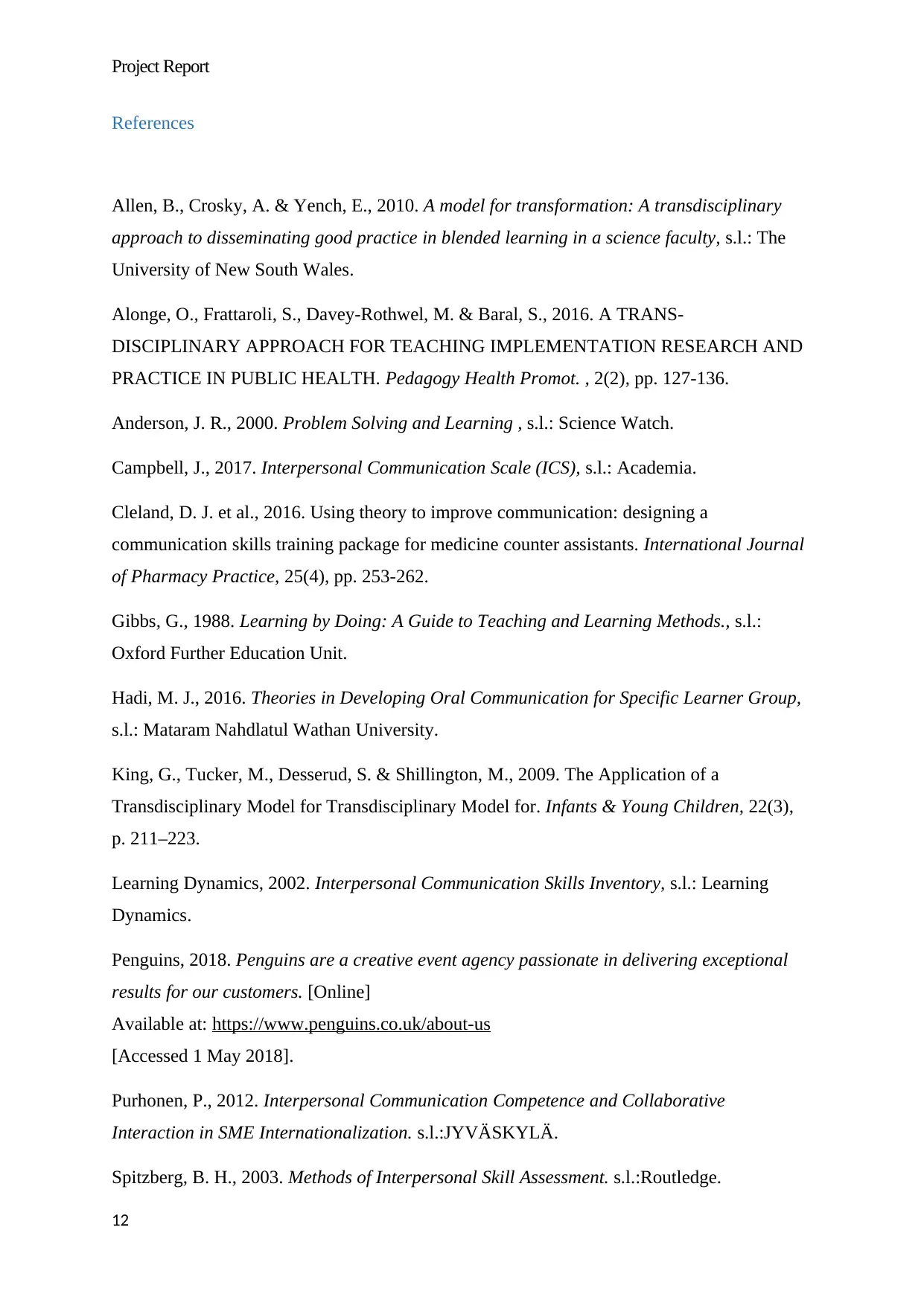
Project Report
References
Allen, B., Crosky, A. & Yench, E., 2010. A model for transformation: A transdisciplinary
approach to disseminating good practice in blended learning in a science faculty, s.l.: The
University of New South Wales.
Alonge, O., Frattaroli, S., Davey-Rothwel, M. & Baral, S., 2016. A TRANS-
DISCIPLINARY APPROACH FOR TEACHING IMPLEMENTATION RESEARCH AND
PRACTICE IN PUBLIC HEALTH. Pedagogy Health Promot. , 2(2), pp. 127-136.
Anderson, J. R., 2000. Problem Solving and Learning , s.l.: Science Watch.
Campbell, J., 2017. Interpersonal Communication Scale (ICS), s.l.: Academia.
Cleland, D. J. et al., 2016. Using theory to improve communication: designing a
communication skills training package for medicine counter assistants. International Journal
of Pharmacy Practice, 25(4), pp. 253-262.
Gibbs, G., 1988. Learning by Doing: A Guide to Teaching and Learning Methods., s.l.:
Oxford Further Education Unit.
Hadi, M. J., 2016. Theories in Developing Oral Communication for Specific Learner Group,
s.l.: Mataram Nahdlatul Wathan University.
King, G., Tucker, M., Desserud, S. & Shillington, M., 2009. The Application of a
Transdisciplinary Model for Transdisciplinary Model for. Infants & Young Children, 22(3),
p. 211–223.
Learning Dynamics, 2002. Interpersonal Communication Skills Inventory, s.l.: Learning
Dynamics.
Penguins, 2018. Penguins are a creative event agency passionate in delivering exceptional
results for our customers. [Online]
Available at: https://www.penguins.co.uk/about-us
[Accessed 1 May 2018].
Purhonen, P., 2012. Interpersonal Communication Competence and Collaborative
Interaction in SME Internationalization. s.l.:JYVÄSKYLÄ.
Spitzberg, B. H., 2003. Methods of Interpersonal Skill Assessment. s.l.:Routledge.
12
References
Allen, B., Crosky, A. & Yench, E., 2010. A model for transformation: A transdisciplinary
approach to disseminating good practice in blended learning in a science faculty, s.l.: The
University of New South Wales.
Alonge, O., Frattaroli, S., Davey-Rothwel, M. & Baral, S., 2016. A TRANS-
DISCIPLINARY APPROACH FOR TEACHING IMPLEMENTATION RESEARCH AND
PRACTICE IN PUBLIC HEALTH. Pedagogy Health Promot. , 2(2), pp. 127-136.
Anderson, J. R., 2000. Problem Solving and Learning , s.l.: Science Watch.
Campbell, J., 2017. Interpersonal Communication Scale (ICS), s.l.: Academia.
Cleland, D. J. et al., 2016. Using theory to improve communication: designing a
communication skills training package for medicine counter assistants. International Journal
of Pharmacy Practice, 25(4), pp. 253-262.
Gibbs, G., 1988. Learning by Doing: A Guide to Teaching and Learning Methods., s.l.:
Oxford Further Education Unit.
Hadi, M. J., 2016. Theories in Developing Oral Communication for Specific Learner Group,
s.l.: Mataram Nahdlatul Wathan University.
King, G., Tucker, M., Desserud, S. & Shillington, M., 2009. The Application of a
Transdisciplinary Model for Transdisciplinary Model for. Infants & Young Children, 22(3),
p. 211–223.
Learning Dynamics, 2002. Interpersonal Communication Skills Inventory, s.l.: Learning
Dynamics.
Penguins, 2018. Penguins are a creative event agency passionate in delivering exceptional
results for our customers. [Online]
Available at: https://www.penguins.co.uk/about-us
[Accessed 1 May 2018].
Purhonen, P., 2012. Interpersonal Communication Competence and Collaborative
Interaction in SME Internationalization. s.l.:JYVÄSKYLÄ.
Spitzberg, B. H., 2003. Methods of Interpersonal Skill Assessment. s.l.:Routledge.
12
⊘ This is a preview!⊘
Do you want full access?
Subscribe today to unlock all pages.

Trusted by 1+ million students worldwide
1 out of 13
Related Documents
Your All-in-One AI-Powered Toolkit for Academic Success.
+13062052269
info@desklib.com
Available 24*7 on WhatsApp / Email
![[object Object]](/_next/static/media/star-bottom.7253800d.svg)
Unlock your academic potential
Copyright © 2020–2026 A2Z Services. All Rights Reserved. Developed and managed by ZUCOL.




